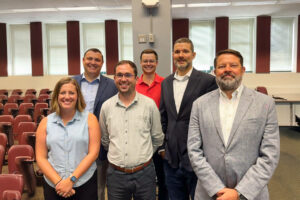Most people don’t usually give much thought to how the toilet paper and disinfecting wipes reach their grocery store shelves, whether their mechanic can get the part needed to fix their car, or whether they will be able to refill their prescriptions. But since last spring, people have become aware of supply chain management and understand the impact of a global disruption to it.
For this reason, the timing of Baker’s new graduate business certificate in supply chain management and logistics couldn’t be better. The online certificate program, scheduled to begin February 2021 and offered through the School of Professional and Graduate Studies, will prepare students for leadership roles in logistics and supply chain management across industry, government, service, and nonprofit organizations. It will also prepare them to take the Council of Supply Chain Management SCPro Level One Certification Exam, an industry certification that assesses comprehensive knowledge of supply chain management.
“Many organizations today recognize the growing need for supply chain and logistics managers,” said Dr. Jeffrey Hart, SPGS instructor. “Industry and manufacturers of all sorts of goods and services, health care systems, government, and even academia employ supply chains. Supply chain management is an essential element in most businesses and organizations that provide goods or services, especially with the nature of a global economy.”
Hart said supply chain management is key to integrating supply and demand management to meet organizational and business objectives and to drive customer satisfaction.
“The coronavirus pandemic has poignantly illustrated the importance of supply chains and supply chain management. The on-hand supply of everything from ventilators and other medical technology, to personal protective equipment, hand sanitizer and cleanser, to toilet paper was severely challenged by exploding demand at the outset of the pandemic. Shortages and rationing on a scale not seen since World War II quickly became the norm in much of the United States and globally.”
Dr. Jeffrey Hart, SPGS instructor
The pandemic shines light on why it’s so important for Baker to offer course work in supply chain management, Hart said.
“The reaction by supply chain managers around the world helped to address initial needs and eventually balance supplies with national, state, organization, and customer demand,” he said. “The enormous effort to address the need created by the global pandemic required supply chain strategy, planning, sourcing, producing, integrating, shipping, storing, and delivery of essential items and goods around the world.”
The graduate business certificate in supply chain management and logistics is composed of five courses and targets individuals holding a bachelor’s degree in a field other than supply chain management. Hart said some of the key roles in the field include supply chain manager, transportation manager, material planning manager, logistics analyst, operations analyst or manager, procurement analyst or manager, purchasing specialist, inventory control administrator, and supply chain business analyst.
“Completers of the certificate will be competitive for supply chain and logistics management positions across industry and government,” he said.
Written by Jenalea Myers, ’08





